
Squatting is the action of occupying an abandoned or unoccupied area of land or a building, usually residential, that the squatter does not own, rent or otherwise have lawful permission to use. Author Robert Neuwirth suggested in 2004 that there were one billion squatters globally. Squatting occurs worldwide and tends to occur when people who are poor and homeless find empty buildings or land to occupy for housing. It has a long history, broken down by country below.
Eurodusnie Collective was an anarchist collective based in Leiden, the Netherlands. It was established in 1997, in opposition to a summit of the European Council at which the Treaty of Amsterdam was signed. A small school was squatted for the purpose of holding a 'counter summit' as a protest over the official EU summit. From that, a more permanent anarchist project evolved which was of national importance.
rampART was a squatted social centre in the Whitechapel area of east London. It was established in a derelict building in Rampart Street which was previously used as an Islamic school for girls. The centre operated as a private members club providing a space for a wide range of groups to carry out their activities. It was managed by volunteers without any funding and with a strong emphasis on consensus decision making and DIY culture.

The Poortgebouw is a national monument located at Stieltjesstraat 38 in the Kop van Zuid area of Rotterdam, the Netherlands. It was built beside the River Maas in 1879 and experienced a range of uses until it was squatted October 3, 1980. It had been standing empty for 2 years and was squatted as a protest intended to highlight the lack of affordable residential housing in Rotterdam.
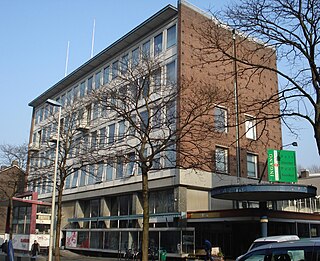
Het Slaakhuis, or Slaakhuys, is a monumental building in Rotterdam, the Netherlands. It was the former offices of the socialist newspaper Het Vrije Volk. The building is a six-storey office block located on a street called Slaak and was squatted in May 2003. The snooker centre next door, which hosted greats such as Ronnie O'Sullivan was also later squatted. In 2011, the complex was evicted and by 2017 it had become a hotel and a Lidl supermarket.

Self-managed social centres in the United Kingdom can be found in squatted, rented, mortgaged and fully owned buildings. These self-managed social centres differ from community centres in that they are self-organised under anti-authoritarian principles and volunteer-run, without any assistance from the state. The largest number have occurred in London from the 1980s onwards, although projects exist in most cities across the UK, linked in a network. Squatted social centres tend to be quickly evicted and therefore some projects deliberately choose a short-term existence, such as A-Spire in Leeds or the Okasional Café in Manchester. Longer term social centres include the 1 in 12 Club in Bradford, the Cowley Club in Brighton and the Sumac Centre in Nottingham, which are co-operatively owned.
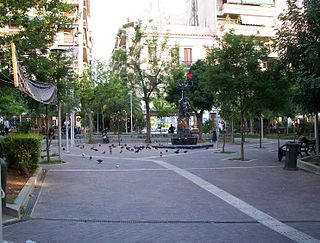
Exarcheia is a neighbourhood in central Athens, Greece close to the historical building of the National Technical University of Athens. The district took its name from a 19th century businessman named Exarchos who opened a large general store there. Exarcheia is bordered on the east by Kolonaki and is framed by Patission Street, Panepistimiou Street and Alexandras Avenue. Exarcheia is renowned for being Athens' historical core of radical political and intellectual activism. Exarcheia is often considered the anarchist quarter of Athens, known for its radical democracy.

Self-managed social centres in Italy exist in many cities. They are part of different left-wing political networks including anarchist, communist, and autonomist. The centres tend to be squatted and provide self-organised, self-financing spaces for alternative and noncommercial activities such as concerts, exhibitions, farmers' markets, infoshops, and migrant initiatives. Over time, some but not all projects have opted to legalize their status.
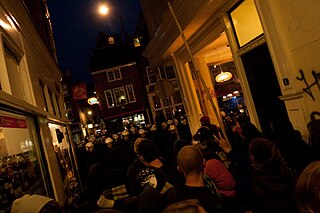
The Dutch squatting ban refers to the law introduced on 1 October 2010, under which squatting in the Netherlands became de jure illegal. Criminalization had first been proposed in the 1970s, but was opposed by the Council of Churches. In 2006, a new plan was proposed and backed by parties including VVD and PVV. When the new law was introduced, squatters occupied the former head office of the fire brigade and there were riots in Amsterdam and Nijmegen. In 2011, the Supreme Court of the Netherlands ruled that the legally forced end of squatting can only occur after an intervention of a judge. Between October 2010 and December 2014, 529 people were arrested for the act of occupying derelict buildings, in 213 separate incidents as a result of which 39 people were jailed.

Squatting in England and Wales usually refers to a person who is not the owner, taking possession of land or an empty house. People squat for a variety of reasons which include needing a home, protest, poverty, and recreation. Many squats are residential, some are also opened as social centres. Land may be occupied by New Age travellers or treesitters.
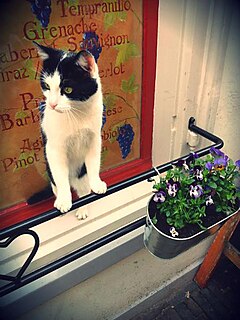
Buurtpoes Bledder was a male domestic cat who attracted national media attention in the Netherlands after becoming a regular fixture at various businesses in Leiden's central district. His exploits became the subject of several news reports and inspired a Facebook fan page that attracted over 1,300 followers from around the world. Bledder died after being struck by an unknown motorist near his home in Leiden.

The Leidsch Dagblad is a Dutch regional newspaper that is published since March 1, 1860. It is owned by the Telegraaf Media Groep and receives most editorial services from the Noordhollands Dagblad.
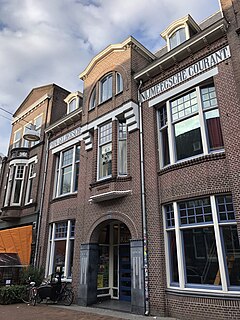
De Grote Broek is a legalised squat and self-managed social centre in central Nijmegen in the Netherlands. It was occupied in 1984 and legalised from 2002 onwards. It spans two sides of a city block and has entrances on both Van Broeckhuysenstraat and Tweede Walstraat. The project consists of two separate housing co-operatives living above a cafe on one side and Extrapool and a music venue on the other. Groups with shared political objectives are hosted at the centre.

We Are Here is a collective of migrants based in Amsterdam, the Netherlands, which campaigns for human rights for its members and all undocumented migrants. The asylum seekers have in many cases had their applications to remain in the Netherlands denied but they either cannot go back or refuse to return to their country of origin. They ask for access to social services such as medical care and housing. The group formed in 2012 and by 2015 contained over 200 migrants from around 15 countries.

Vrankrijk is a legalised squat and self-managed social centre on the Spuistraat in central Amsterdam. There is an events space on the ground floor and above it a separate housing group.
The WNC squat was a self-managed social centre in Groningen, the Netherlands. It was squatted in 1985 and evicted in 1990.

Squatting in the Netherlands is the occupation of unused or derelict buildings or land without the permission of the owner. The modern squatters movement began in the 1960s in the Netherlands. By the 1980s, it had become a powerful anarchist social movement which regularly came into conflict with the state, particularly in Amsterdam with the Vondelstraat and coronation riots.
De Vloek was a squatted, self-managed social centre in The Hague, the Netherlands, between 2002 and 2015. Located on Hellingweg 127 in Scheveningen, beside the North Sea, the squat hosted workplaces, living spaces, a venue and a vegan restaurant. The local council tolerated the occupation until 2014, when a political struggle over the eviction began. Some political parties supported the squatters and the Scheveningen Pier was briefly occupied. The building was evicted in September 2015 with seven arrests.

The Ubica buildings are two adjacent buildings standing at 24 and 26 Ganzenmarkt, in central Utrecht, the Netherlands. Number 24 is a rijksmonument. The first recorded mention of the buildings is from 1319. After centuries of residential use, the buildings were bought by the Ubica mattress company in 1913 and used until a devastating fire in 1989. The buildings were then squatted for 21 years, before being redeveloped into a hotel and café-restaurant in 2014.

Centro Sociale Leoncavallo is a self-managed social centre in Milan, Italy, which exists since a former factory on via Leoncavallo was squatted in 1975. It was evicted and partially demolished in 1989, then quickly reoccupied and rebuilt. It was evicted again in 1994 and briefly moved to a warehouse for six months before occupying its still extant location on via Antoine Watteau. Activities include concerts, theatre, debates, exhibitions and a radio station. The centre describes itself as Leoncavallo Self-Managed Public Space.
















